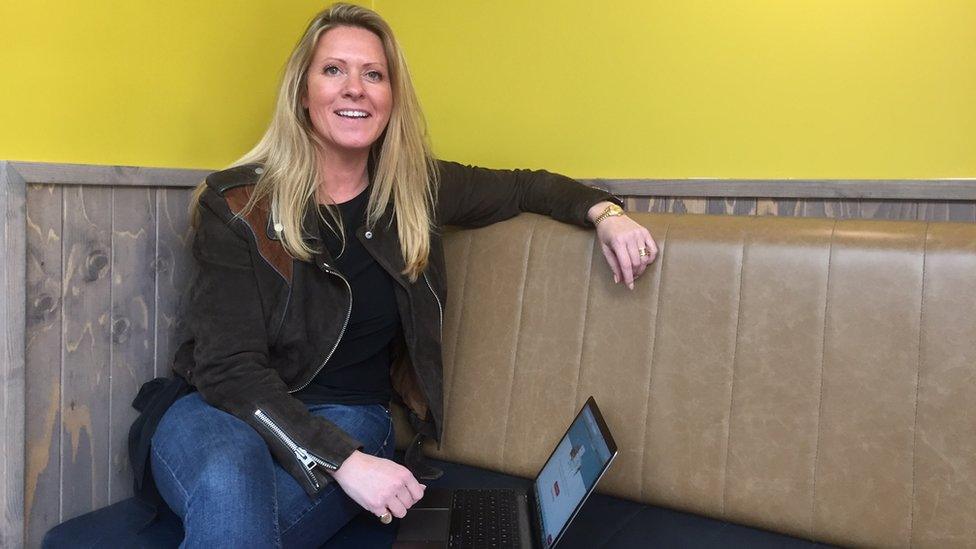Work-life balance: Can your job be as flexible as this?
- Published

Staff at Paycircle organise their own hours and holiday
When 22-year-old Roisin Gray asked about the finishing time for the day, her colleagues in the office simply laughed.
Now, a week into her new job, she is getting used to choosing the hours she works and even how much leave she takes.
"My friends can't get their heads around how we work," she says. "But, as I don't have someone watching over me all the time, I just get on with it. It means I want to work harder."
She works at Paycircle, a payroll software provider to small businesses, which is one of a rising number of firms with a liberal attitude to working practices.
In fact, they are so flexible, you could call them yoga employers.
Questions persist about such an approach: How successful can it be? Is it open to abuse by staff? Are bosses actually using it as a smokescreen to ensure staff are never off duty?
Binding trust
Paycircle and its umbrella company Optimal Compliance have 15 staff, four of whom are women, with an average age of 27, excluding the founders.
There is no company handbook, the job interview process usually involves the whole team and holiday entitlement is entirely self-controlled. Flexibility extends to hours and attendance at the office in Ascot or the "company apartment" in London.
"It is based on trust and maturity. Colleagues are trusted to get the work done and there is respect, so you do not let down the other 14 people," says co-founder Catherine Pinkney, an evangelist for non-traditional working.
"We are not totally hippyish. This is not a playground. We work to tight deadlines."

Catherine Pinkney says staff are rewarded for results
Staff are expected to attend a Monday morning meeting, but then work when and where they please.
One software engineer divides his time between the UK and Italy. Others spend more time near the office where they can find the company payment card for use in team coffee rounds or trips to the pub.
Ms Pinkney says only one employee in eight years has been told to go after a "loss of respect". He "could not grasp the culture", she says.
The current crop of young staff appear to support the system.
James Edwards, 30, says he "no longer thinks about working hours". Yazmin Cooper, 22, says the work-life freedom can only be matched by self-employment.
"My worst nightmare is to go back to a traditional corporate, with a uniform and no mobile phones," she says.
That phone, and a laptop, allows such a flexible approach to function. Staff are connected via a chat app and many check emails and other messages during the evenings and weekends.
Therein lies an apparent danger in this way of working - an inability to switch off. Staff may be allowed to take a week's holiday at a day's notice, but they are also expected to ensure things operate smoothly without them.
There is no requirement to logon from the beach, but at times it may be a necessity. After all, pay rewards are based, in part, on the amount of responsibility individual members of staff take on for themselves. They also receive a slice of the company's profits every three months.

Your rights to flexible working

Every employee in the UK has the statutory right to request flexible working, external after 26 weeks of employment.
Requests should be in writing stating the date of the request and whether any previous application has been made and the date of that application
Requests and appeals must be considered and decided upon within three months of the receipt of the request
Employers must have a sound business reason for rejecting any request
Employees can only make one request in any 12 month period
"A poor balance between an employee's work commitments and their other responsibilities can lead to stress, high absence and low productivity," says conciliation service Acas.
"Employees who have a better work-life balance often have a greater sense of responsibility, ownership and control of their working life. If an employer helps an employee to balance their work and home life this can be rewarded by increased loyalty and commitment.
"They may also feel more able to focus on their work and to develop their career."
Source: Acas
Could flexible working for all backfire?

Holiday or office by the sea?

Does flexibility actually mean you are never free from email contact?
The danger of virtual presenteeism is highlighted in the Quality of Working Life Report, external, published by the Chartered Management Institute in January.
The report recommends that employees should have "the freedom, trust and autonomy to make their own decisions about how they work".
"Hold people accountable for the outcomes of their work, but do not be prescriptive about how they work," it suggests.
Yet, its research also suggests managers themselves work an hour's overtime every day - by accessing work via a smartphone. That equates to 29 working days, cancelling out the typical amount of annual leave.
Dr Maire Kerrin, director of the Work Psychology Group, external, says anyone embarking on flexible working requires self-discipline. It is easy for someone moving to a four-day week to see their work seep into evenings and weekends.
For their part, employers must properly assess how effective a flexible approach will be, rather than simply be drawn by the appeal such a policy has for staff recruitment and retention.
"The practical application [of flexible working] requires discussion. The common mistake is assuming that it has the same benefit for everybody," she says.
Dr Kerrin argues that such a policy of unlimited flexibility is easier in a big organisation than in a small business. The hours of those who take more holiday may be balanced out by the work of those who are early in their career and want to "plough on".
Ultimately, she argues that the need for employers to compete for the best talent, and a culture of employees increasingly asking for more flexibility will drive more flexible working.
Virgin territory

Richard Branson was prompted by his daughter to introduce unlimited leave
The idea of an unlimited holiday allowance for staff, without the need for approval, is being implemented by a host of employers.
One of the most high-profile - Richard Branson's Virgin Group - adopted the policy for headquarters staff in 2014.
"It is left to the employee alone to decide if and when he or she feels like taking a few hours, a day, a week or a month off," wrote the billionaire on his blog at the time.
"The assumption being that they are only going to do it when they feel 100% comfortable that they and their team are up to date on every project and that their absence will not in any way damage the business - or, for that matter, their careers!"
The BBC News website called and left messages with Virgin, to ask whether the policy has proved to be a success or not. With more than a hint of irony, nobody has been available to return the calls.
Flexibility, perhaps, can extend too far.
- Published30 June 2014

- Published4 March 2016

- Published2 February 2016

- Published24 September 2014
